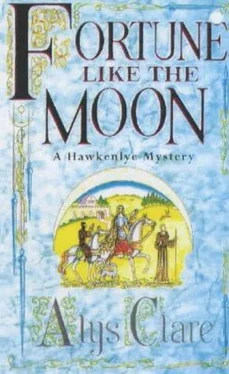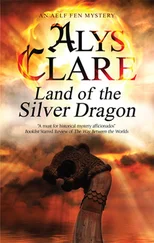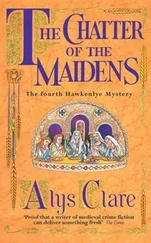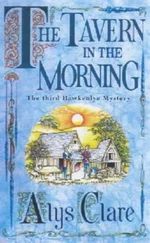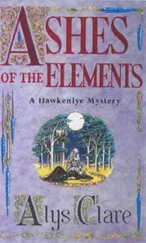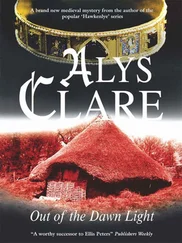Alys Clare - Fortune Like the Moon
Здесь есть возможность читать онлайн «Alys Clare - Fortune Like the Moon» весь текст электронной книги совершенно бесплатно (целиком полную версию без сокращений). В некоторых случаях можно слушать аудио, скачать через торрент в формате fb2 и присутствует краткое содержание. Год выпуска: 0101, Издательство: St. Martin, Жанр: Исторический детектив, на английском языке. Описание произведения, (предисловие) а так же отзывы посетителей доступны на портале библиотеки ЛибКат.
- Название:Fortune Like the Moon
- Автор:
- Издательство:St. Martin
- Жанр:
- Год:0101
- ISBN:нет данных
- Рейтинг книги:3 / 5. Голосов: 1
-
Избранное:Добавить в избранное
- Отзывы:
-
Ваша оценка:
- 60
- 1
- 2
- 3
- 4
- 5
Fortune Like the Moon: краткое содержание, описание и аннотация
Предлагаем к чтению аннотацию, описание, краткое содержание или предисловие (зависит от того, что написал сам автор книги «Fortune Like the Moon»). Если вы не нашли необходимую информацию о книге — напишите в комментариях, мы постараемся отыскать её.
Fortune Like the Moon — читать онлайн бесплатно полную книгу (весь текст) целиком
Ниже представлен текст книги, разбитый по страницам. Система сохранения места последней прочитанной страницы, позволяет с удобством читать онлайн бесплатно книгу «Fortune Like the Moon», без необходимости каждый раз заново искать на чём Вы остановились. Поставьте закладку, и сможете в любой момент перейти на страницу, на которой закончили чтение.
Интервал:
Закладка:
Then the man had left.
But she had known. Abbess Helewise had known.
When he went to seek her out to tell her he was leaving the Abbey, she hadn’t, thank God, tried to stop him. It was as if some practical part of her were saying, ‘We’ve done all we can do, my monks, my nuns and I. If you are to be made whole again, it is up to God to make you so. You are in His hands now.’
He had knelt before her as he had taken his leave, and, in a whisper, asked for her blessing. She had given a small gasp, almost as if she read what was in his heart. Then he had felt the pressure of her thumb as she traced the sign of the cross on his forehead and said quietly, ‘God go with you, Olivar.’
She had given him Gunnora’s cross.
* * *
He had returned home to Brice, since that was the only place he could think of to go. Brice had adopted the tack of trying to jolly him out of his grief. Dear old Brice. Olivar smiled faintly at the memory of his brother, perplexed as ever before an emotion too deep for him to understand, suggesting they went off on pilgrimage together. ‘We could go to Santiago, even to the Holy City, if the Infidel will let us in!’ he said. ‘Wouldn’t you like that, Olivar? Wouldn’t it be good, to get right away from here, to be on the road together, meet new people, see wonderful sights? I’m willing! I’d love it, truly I would. I’ll go anywhere, if it’ll help you.’
He’d meant well.
They’d told him all about that other business, with Gunnora’s wild cousin Elanor. Olivar pitied both her and that foolish young husband of hers. They had been greedy and callous, yes, but whoever had imagined they killed Gunnora, Elanor holding her while Milon wielded the knife, had been quite wrong. Milon didn’t have it in him to kill, of that Olivar was sure. Not coldly and calculatingly, anyway, although it did appear that he had strangled Elanor in the heat of an angry quarrel.
He had gone on trial for that. The Abbess and that big knight, who had been sent to investigate the deaths, had given evidence. Not willingly, or so folk said. Neither, apparently, had spoken out vindictively against Milon; they’d just answered the questions asked of them truthfully. Tried, as far as they could, to speak up for him.
But the truth had been bad enough to hang him. Murder. He’d murdered Elanor, his pretty, lively young wife. He had admitted as much as they led him out to his execution. He had gone to his Maker pleading for forgiveness, crying out that he hadn’t meant to kill her, that her death had been a terrible accident, that he’d give anything, anything, his own life, even, to have her alive again, laughing and dancing by his side.
Olivar sympathised. Although, in truth, he had to admit that his beloved Gunnora hadn’t been a woman to laugh and dance — bless her, she was not given to frivolity — still, he, too, would have willingly laid down his own life if, by doing so, she would live again.
But the laws of nature did not operate that way. And nor did the laws of God.
* * *
When Milon was dead and buried, Brice had made up his mind to put the whole wretched business behind him. Despite having lost his wife, having his wife’s sister die through a terrible accident which continued to devastate his brother, and having his bastard cousin-by-marriage die by the hangman’s noose for killing his bride, still, he had returned to normal life. With what some people were calling indecent haste.
Let them, Olivar thought. They didn’t know Brice. Didn’t understand his direct, uncomplicated nature, his lack of sentiment; even his own brother was tempted sometimes to call him shallow. No, he corrected himself, Brice wasn’t really shallow. He was practical, down-to-earth, a little unimaginative. But he was a good man. He would marry again, in time, although no bride, surely, would bring him what would have come his way, had Dillian not died before her father did. Few fathers-in-law owned estates like Winnowlands.
Other than Brice’s gift to Hawkenlye Abbey, the entire Winnowlands fortune was going to the Crown. And there was a rumour, on the face of it unlikely but strangely persistent, that the new King, Richard, planned to award a part of the estate and a not insignificant manor house to that big knight …
I don’t care if he does, Olivar thought as he neared the river. I wish the fellow well of it. Nobody was ever truly happy at Winnowlands, not in Alard’s household, anyway. Let the man do better if he can. Me, I am beyond such things.
He clambered down to the water, and, pausing by the shallows, where the salmon ran in spring, he sat down on the soaked grass. They had come here often together, he and Gunnora. That was why, of course; why it had become his special place.
He had always thought she was intended for his brother. Brice, the elder son at Rotherbridge, would be betrothed to Gunnora, elder daughter of Alard of Winnowlands. Loving her from afar, as he had done for as long as he could remember, he had had to endure the spectacle of Brice and Gunnora together, stiffly and reluctantly leading the dancing, sitting together at table on feast days.
Then, quite unexpectedly, a tiny glimmer of hope had started to shine. Shortly before her eighteenth birthday, when, everyone expected, the betrothal would be announced, she had come to seek him out.
‘I do not wish to marry your brother,’ she had told him. Right here, beside the river, in this very spot. ‘I do not love him, and I fear he would not make me happy.’
He had tried to read the expression in those deep blue eyes.
Why was she telling him this? Why, indeed, had she taken the trouble to find out where he was and come to find him?
Could it — could it possibly — be that she did not love his brother because she loved another?
Him?
He had stepped forward. Not to touch her — oh, no, not that, not then — and the tense silence had continued.
A lady could not be the first to speak in such matters, as well he knew. Had always known. So, heart thumping, mouth so dry that he could hardly speak, he spoke instead.
Said, simply, humbly, ‘Lady, could you, do you think, love me?’ She had made no answer, merely cast down those great eyes in a delicate gesture of modesty. ‘I love you, Gunnora,’ he had rushed on, ‘I have always loved you! Will you agree to marry me?’
Then she had looked up. Met his desperate eyes with her own. In which, for a split-second, he had seen what was, surely, an unlikely emotion.
Triumph.
But then it was gone, and, in the unspeakable joy of taking her, at last, in his arms, he had forgotten all about it.
He had fallen in with her plan without a moment’s thought, helped and encouraged her every step of the way. It had seemed such a clever plan! For her to retire behind the stout walls of a convent until Brice was safely married to someone else, then emerge for Olivar to claim her as his bride, what brilliance! And it was foolproof — Alard might well refuse his permission for Gunnora to choose a husband, but he could hardly argue with a daughter’s pious intention of becoming a nun.
The year he had been forced to endure without her had been constant torment. Before, even though he had thought her out of his reach, he had had the dubious comfort of seeing her regularly. Speaking with her, listening to her voice, watching her graceful ways. But then, to be awarded the great prize of her love, only to lose her behind the walls of Hawkenlye, had been almost more than he could bear.
The night he went to meet her had been both anxious and terribly thrilling. He had not been able to eat for a week, and he had been subject to fearful headaches, which would come without warning, strike into one side of his forehead like the point of a dagger, and, while they endured, leave him good for nothing but lying in the darkness, periodically vomiting into a pail.
Читать дальшеИнтервал:
Закладка:
Похожие книги на «Fortune Like the Moon»
Представляем Вашему вниманию похожие книги на «Fortune Like the Moon» списком для выбора. Мы отобрали схожую по названию и смыслу литературу в надежде предоставить читателям больше вариантов отыскать новые, интересные, ещё непрочитанные произведения.
Обсуждение, отзывы о книге «Fortune Like the Moon» и просто собственные мнения читателей. Оставьте ваши комментарии, напишите, что Вы думаете о произведении, его смысле или главных героях. Укажите что конкретно понравилось, а что нет, и почему Вы так считаете.
